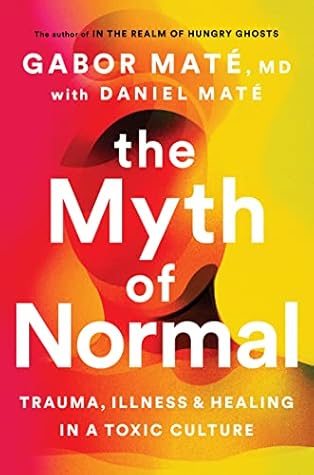More on this book
Community
Kindle Notes & Highlights
the personal histories of individuals always reveal meaning.
psychologist Julie T. Anné, who specializes in treating eating disorders, nails it: with her clients, she says, “three lacks” are typical—lack of control, identity, and self-worth—along with a need to numb pain.
From behavioral problems to full-blown mental illness, it’s not anyone’s fault—nor, as we’ve seen, the fault of their brains or their genes. It is an expression of untended wounds, and it is meaningful.
“allostatic load”: the wear and tear on the body of having to maintain its internal equilibrium in the face of changing and challenging circumstances,
uncertainty, conflict, lack of control, and lack of information are considered the most stressful stimuli
Capitalism’s influence today runs so deep and wide that its values, assumptions, and expectations potently infuse not only culture, politics, and law but also such subsystems as academia, education, science, news, sports, medicine, child-rearing, and popular entertainment.
refusal to recognize broad economic and political conditions as relevant to individual health and happiness is a core feature of materialistic ideology.
To say that all kinds of addictions are a problem of bad choices and habits is solely wrong and ignorant and even privileged a person like this shouldnt be in a position of power
All stressors represent the absence or threatened loss of something an organism perceives as necessary for survival.
ominously, lower cortisol levels.[11] The latter is a marker of long-term stress: a sign that people’s healthy, protective stress-response mechanism was burning out.
A signature marker of stress is inflammation.
inflammatory gene activity in people confronting a sense of threat or insecurity for more than a short period of time.
America is a democracy that’s run for the benefit of corporations.
The notion that capitalism is meant to provide equality and opportunity for all must be taken on faith, since history and material reality provide no evidence for it.
“When people start to lose a sense of meaning and get disconnected, that’s where disease comes from, that’s where breakdown in our health—mental, physical, social health—occurs,”
“it doesn’t matter if a few people are going to die around the edges, but us strong guys, we’re going to make it good for ourselves and for everybody. Now I’ve converted. Those ideas are incredibly toxic. They simply do not allow people to be people.”
Basically most of the pleople with money. Ex. El juxio del alquiler who wouldnt cre if you go banrupt as long as you pay in full
it cannot exempt us from the inner impacts of having our needs for interconnection, purpose, and genuine self-esteem denied. Neither achievements nor attributes nor external evaluations of our worth can possibly compensate us for such a lack.
Alienation is inevitable when our inner sense of value becomes status-driven, hinging on externally imposed standards of competitive achievement and acquisition, and a highly conditional acceptance—I
“presence [of] and search for meaning in life are important for health and well-being.”
the more meaningful you find your life, the better your measures of mental and physical health are likely to be.
“Our twenty-first-century world demands that we focus on pursuits that seem to be in constant competition for our time, attention, energy, and commitment.
deliberately and with the utmost ingenuity targeted the brain circuits of pleasure and reward to foster addictive compulsions.
What the system sells as happiness is actually pleasure, a philosophical and economic distinction that makes all the difference between profit or loss. Pleasure, Rob Lustig pointed out, is “This feels good. I want more.” Happiness, on the other hand, is “This feels good. I am contented. I am complete.”
pleasure employs dopamine and opiates, both of which operate in short-term bursts, while contentment is based on the more steady, slow-release serotonin apparatus.
All addictions, however, commandeer the dopamine (incentive/motivation) and/or opiate (pleasure/reward) systems of the brain.
Pleasure in the absence of contentment, and especially when sought in instant gratification, may be...
This highlight has been truncated due to consecutive passage length restrictions.
True happiness, being a non-commodity, does not make itself obsolete.
deliberate corporate conspiracy to hook people on addictive junk foods, with no regard for health consequences.
It’s an appalling example of how rampant free-enterprise materialism has hijacked the science of neurophysiology to deregulate the brain, just as it “deregulates” the financial markets.
Life-impairing but lucrative deceptions have been repeatedly exposed in virtually every industry and in the most prestigious firms, from pharmaceuticals to the extraction of raw materials, from air travel to car manufacturing to food production.
United States “the drug capital of the world,”
in practice, junk foods that rapidly elevate blood sugar levels—got hungrier faster.
prey on people who, owing to trauma, penury, and grinding oppression, are especially vulnerable to addictive substances.
Emotional suppression and its biological harms are, indeed, among the many wounds racism inflicts.
come home and cry. Don’t cry there. Talk about emotions being traumatizing: What happens to a people that can’t show the full range of their emotions?


